Eight cards are marked 3, 4, 5, 6, 7, 8, 9, and 10 such that each card has exactly one of these numbers. A card is picked without looking. Find each probability. Write each answer as a fraction, a decimal, and a percent.
P(9)
1/8, 0.125, 12.5%
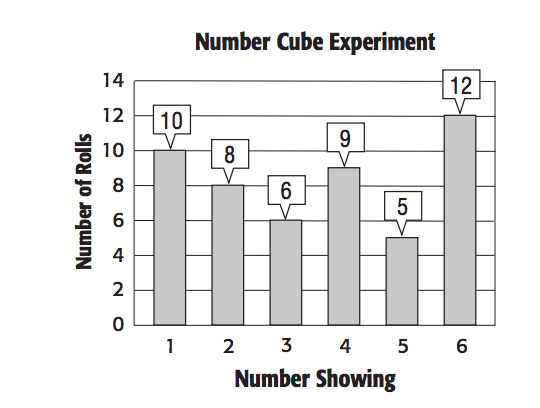
A number cube is rolled 50 times and the results are shown in the graph.
Find the EXPERIMENTAL probability of rolling a 2.
4/25
Rolling two number cubes and tossing one coin.
72
If the outcome of one event doesn't affect the other event, the events are ________.
Independent events
Eight cards are marked 3, 4, 5, 6, 7, 8, 9, and 10 such that each card has exactly one of these numbers. A card is picked without looking. Find each probability. Write each answer as a fraction, a decimal, and a percent.
P(3 or 4)
1/4, 0.25, 25%
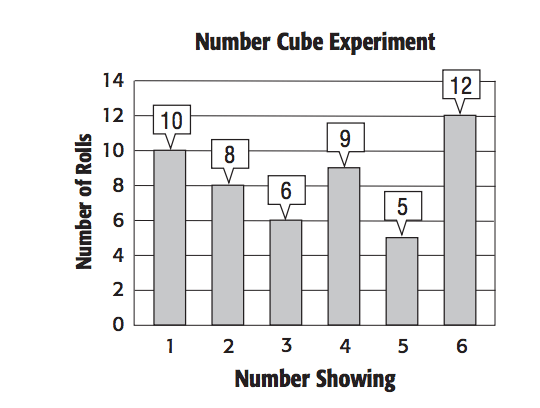
A number cube is rolled 50 times and the results are shown in the graph.
What is the THEORETICAL probability of rolling a 2?
1/6
Making a sandwich with ham, turkey, or roast beef; Swiss or provolone cheese; and mustard or mayonnaise
12
A _____ is an arrangement, or listing, or objects in which order is important.
permutation
Eight cards are marked 3, 4, 5, 6, 7, 8, 9, and 10 such that each card has exactly one of these numbers. A card is picked without looking. Find each probability. Write each answer as a fraction, a decimal, and a percent.
P(not 5 and not 10)
3/4, 0.75, 75%
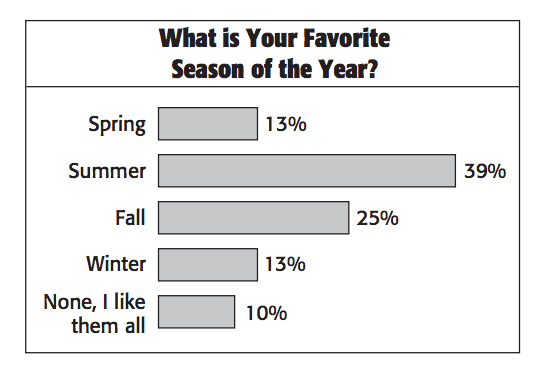
Use the results of the survey.
What is the experimental probability that a person's favorite season is fall? Write the probability as a fraction.
1/4
Choosing 3 sizes of bottled water and from distilled, filtered, or spring water
9
The _____ of rolling a 1 on a number cube is 1/6.
Probability
Eight cards are marked 3, 4, 5, 6, 7, 8, 9, and 10 such that each card has exactly one of these numbers. A card is picked without looking. Find each probability. Write each answer as a fraction, a decimal, and a percent.
P(less than 3)
0, 0.0, 0%
Use the results of the survey.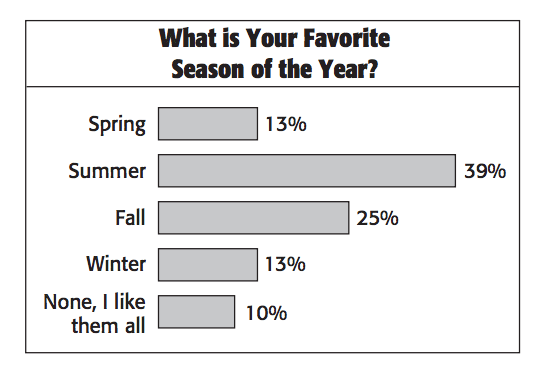
Out of 300 people, how many would you expect to say that fall is their favorite season?
75
Choosing a 4-letter password using only 5 letters that may each be used more than once.
625
The ____ can be used to find the total number of possible outcomes by using multiplication.
Fundamental Counting Principle
Of the water lilies in the pond, 43% are yellow. The others are white. A frog randomly jumps onto a lily. Describe the complement of the frog landing on a yellow lily and find its probability.
The complement of the frog landing on a yellow lily is landing on a white lily. The probability of the complement is 57/100, 0.57, or 57%.
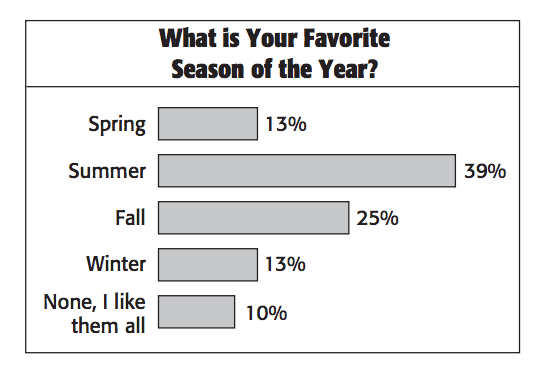
Out of 650 people, how many more would you expect to say that they like summer more than they like winter?
169
676,000
______, or relative frequency, is based on what actually occurs during an experiment.
Experimental Probability
There are 100 prize tickets in a bowl, numbered 1 to 100. What is the probability that an event numbered prize ticket will be chosen at random, not replaced, then an odd numbered prize ticket will be chosen? Does this represent an independent or dependent event? Explain.
25/99
dependent event
The second event is impacted by the first.